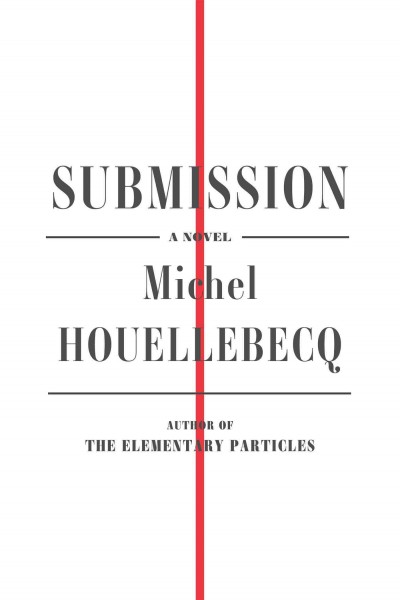 For the first time in a while, certainly all year, I am unsure of what to make of a book.
For the first time in a while, certainly all year, I am unsure of what to make of a book.
I first heard of Submission through a conversation with a customer. Written by acclaimed French novelist Michel Houellebecq, Submission was apparently “the most talked about book in Europe right now” or at least the most controversial. I picked up a copy that same day. Two days later, I had finished it.
Houellebecq, whom the New Yorker calls “the most famous French novelist of his generation,” was already a controversial figure prior to the release of Submission. His previous works have drawn polarizing views from international critics and have led to his being labeled as misogynist and racist (both of which he insistently denies). He was even taken to court for “inciting racial hatred” during the tour for his novel Platform, and, although he was acquitted, he later moved to Ireland where he lived in exile for a few years. Submission, his first novel in five years, which chronicles an Islamic political party’s rise to power in France in the year 2022, was sure to fan the flames. But not even Houellebecq could have predicted (nor, indeed, have wanted) the publicity that would follow.
On January 7 2015, to publicize the release of Submission that same day, Houellebecq appeared on the cover of French magazine Charlie Hebdo over the caption, “The Predictions of Wizard Houellebecq.” By gruesome coincidence, this would be the very day that two men belonging to Al-Qaeda stormed the Parisian office of Charlie Hebdo and killed 11 people. Houellebecq subsequently canceled his promotional tour, but Submission was already set to become one of the biggest books of the year.
The beginning was unquestionably the most enjoyable part of the book to read. Here we are introduced to Francois, a forty-something-year-old professor of literature at the prestigious Sorbonne University in Paris. Single, cynical, and rather brilliant, Francois has spent the entirety of his adult life studying and teaching the literature of renowned French author J.K. Huysmans. His adoration borders on obsession and leaves little room in his life for interest in politics or human relations. He has no contact with his parents; his only friends are a couple of colleagues from the university. He casually dates his students, averaging a year or so with each woman until she reveals that she has “met someone.” He is essentially alone, and he prefers it that way. But neither the reader nor Francois is under the impression that he is at all happy.
The beauty of these early chapters lies in Francois’ love of Huysmans, of literature in general. “Only literature can put you in touch with another human spirit…with all its weaknesses and grandeurs, its limitations, its pettinesses, its obsessions, its beliefs…Only literature can give you access to a spirit from beyond the grave.” This is the author speaking as much as it is his narrator. It’s utterly mesmerizing to follow an expert in his craft as he weaves through such broad and varied topics as the nature of sexuality and romance, the role of religion in society, and the cultural beliefs that are necessarily doomed (feminism, secularism) and favored (patriarchy).
Conflict introduces itself to Francois’ monotonous life as the elections of 2022 draw near and rumors of sudden and drastic change pass through the university faculty. The new-to-France political party known as the Muslim Brotherhood is rapidly gaining support under its capable and charismatic leader Ben Abbes, and professors hypothesize the educational and social reforms that are sure to follow Islamic leadership in France. Francois is unable to hide from the social unrest unfolding in a world that he has so far been able to mostly ignore. Soon he must confront the same spiritual and moral dilemmas that his beloved Huysmans faced nearly two hundred years earlier.
I’m still trying to decide how I feel about the book as a whole. It was thoroughly enjoyable to read, and I learned a lot about French politics and literature (although I had to be content to let some of the more obscure allusions elude me). But its cynicism and misogyny at times overwhelmed me. Critics can’t seem to make up their minds either. Despite Houellebecq’s insistence that the novel is not satirical, many reviewers label the book as political satire. I’d love for more Americans (and particularly Jacksonians) to read this book so that we can participate in the debate that is prevalent in European literary circles.
“Even in our deepest, most lasting friendships, we never speak as openly as when we face a blank page and address a reader we do not know,” says Francois in one of his musings on Huysmans. In Submission, Houellebecq has a lot to say, but it’s the reader’s job to detect exactly what that is.


Comments are closed.